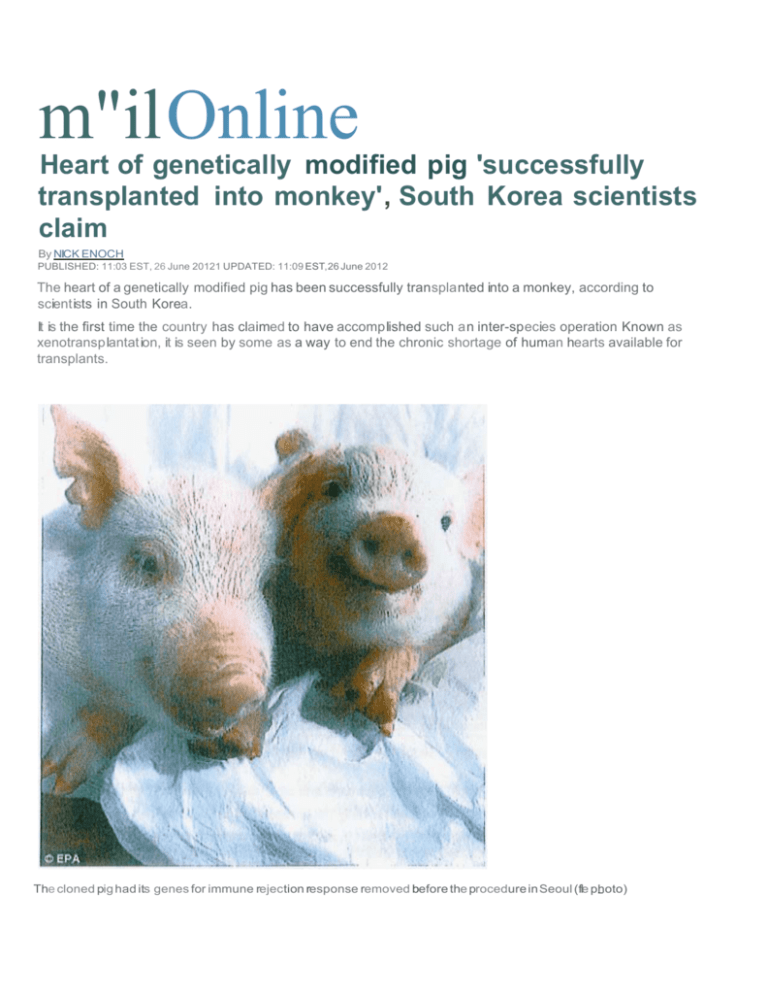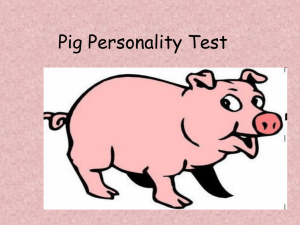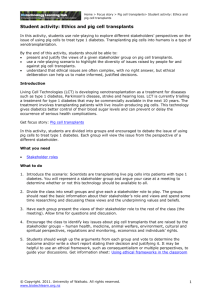Heart Transplant article
advertisement

m"ilOnline
Heart of genetically modified pig 'successfully
transplanted into monkey', South Korea scientists
claim
By NICK ENOCH
PUBLISHED: 11:03 EST, 26 June 20121 UPDATED: 11:09 EST,26 June 2012
The heart of a genetically modified pig has been successfully transplanted into a monkey, according to
scientists in South Korea.
It is the first time the country has claimed to have accomplished such an inter-species operation Known as
xenotransplantat ion, it is seen by some as a way to end the chronic shortage of human hearts available for
transplants.
The cloned pig had its genes for immune rejection response removed before the procedure in Seoul (file photo)
---..1
transplanted the heart of a cloned pig into this monkey
Before the controversial procedure, conducted in Seoul, the cloned pig had its genes responsible for immune
rejection removed.
The ultimate aim of such experimentation would be to put pig hearts and other swine organs into humans.
And the South Koreans believe this could become a commercially viable reality within five years.
The first known transplant of a genetically engineered pig heart in a primate was performed in 1994.
But the possibility of animal-to-human operations has divided the medical ethics community.
Medical ethicist Associate Professor Nicholas Tonti-Filippini, speaking in 2010, said such transplants had the
potential to bring animal diseases into the human population.
He said the creation of genetically modified pigs was not ethically acceptable, explaining: 'It is basically a
human-pig, a hybrid, or whatever you want to call it.
'It is about whether the community is prepared to accept a part human, part animal.'
South Korean scientists first claimed to have cloned a piglet whose organs were genetically modified to make
them more suitable for human transplants in 2009.
Lead scientist Lim Gio-Bin said the cloned piglet, born on April 3, had been genetically altered to lack the
'alpha-gal' gene which triggers tissue rejection, according to PhysOrg.
He said his government-sponsored team , involving scientists from four universities and two research institutes,
used stem cells of smaller-than-normal pigs to clone 'mini-pigs' with modified genes.
Immune-rejection has been a major hurdle in human organ transplants.
Pig organs are well suited for transplantation but are coated with sugar molecules that trigger acute rejection in
human bodies.
Human antibodies attach themselves to such molecules and quickly destroy the transplanted pig organ.
In cloning a pig called Xeno, the scientist said his team adopted almost identical technology to that used by
U.S. scientists in 2002 to create cloned piglets, in which one copy of the sugar: producing gene was 'knocked
out'.
An organism receives two copies of a gene, one from the mother and one from the father. Scientists have tried
to produce pigs lacking both copies, so far unsuccessfully.
'Through our achievement, South Korea became the second country in the world to clone such piglets after the
United States,' Lim said at the time.
Lim said then that his team would conduct clinical trials on humans in 2012 and he believed genetically
modified mini-pigs could be used commercially around 2017.
Two years ago, Australian scientists kept pig lungs alive and functioning with human blood.
The breakthrough came after scientists at Melbourne's St Vincent's Hospital were able to remove a section of
pig DNA which made the pig organs incompatible with human blood.
Prof Tony D'Apice- who had been breeding pigs for possible transplants since 1989- said human DNA was
added to the engineered animals to control blood clotting and rejection in humans.
Dr. Glenn Westall, from the Alfred Hospital in Melbourne, said the world-first discovery meant pig-human lung
transplants were a real prospect.
Read more :http:/lwww.dailymail.eo.uk/news/article-2164964/South-Korea-scientists -successfully-transplant-heart-genetically-modified-pig monkey.h!ml#ixzz2RP6NF HD4
Follow us:@MaiiOnline on Twi!ler1 DailyMail on Facebook
Discussion Questions
a) Do you think a monkey or pig heart would work in a human?
b) Are these types of experiments 01< to perform on animals? Why? Why not?
Heart Quiz
=oxygen-rich
blood
=oxygen-poor
blood
A.
D.
B.
E.
C.
F.
Heart Guide
=Oxygen-rich blood
=Oxygen-poor blood
A.
Aortic arch (Aorta)
D.
Septum
B.
Pulmonary trunk
Left ventricle
c.
Left atrium
E.
F.
I
n
t
e
Right ventricle
Pig Heart/Human Heart
Compare and Contrast
Use the human heart diagram poster, the human heart model, and the pig hea rt diagram on
page 3 to answer the following questions.
List 3 things about the pig heart that are similar to the
human heart:
1
2
3
List any difference that you notice. {It may be hard!)
1
2
3








